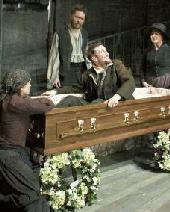SITE GUIDE
SEARCH
REVIEWS
FEATURES
NEWS
Etcetera and
Short Term Listings
LISTINGS
Broadway
Off-Broadway
NYC Restaurants
BOOKS and CDs
OTHER PLACES
Berkshires
London
California
New Jersey
DC
Philadelphia
Elsewhere
QUOTES
TKTS
PLAYWRIGHTS' ALBUMS
LETTERS TO EDITOR
FILM
LINKS
MISCELLANEOUS
Free Updates
Masthead
Writing for Us
A CurtainUp  London Review
London Review
 London Review
London ReviewDying For It
by Neil Dowden
|
Why live?
---- Yegor |

Scene from Dying For It
(Photo: Manuel Harlan) |
It's not difficult to see why The Suicide should not exactly enamour itself with the Soviet authorities. As an absurdist black comedy it didn't fit into the "socialist realist" model, but more importantly its irreverent political satire paints a very negative picture of the post-Bolshevik Revolution era. Moira Buffini's free adaptation of the play, renamed Dying For It, preserves its subversive qualities, while giving full rein to its wonderfully surreal humour. In Anna Mackmin's dynamic production the result is an intoxicating rollercoaster ride of wild laughter overlooking the precipice of despair.
Unemployed Semyon (Tom Brooke) has had enough. He is forced to live off the meagre earnings of his wife Masha (Liz White), as they live in the hallway of the cramped flat belonging to his interfering mother-in-law Serafima (Susan Brown), where they are interrupted by neighbour Alexander (Barnaby Kay) having noisy sex with his sluttish girlfriend Margarita (Susan Stanton) and by the complaints of voyeuristic communist postman Yegor (Paul Rider). With no self-esteem left, Semyon decides to shoot himself. But word gets out, and suddenly he is besieged by people begging him to kill himself on behalf of their different causes.
The intellectual Aristarkh (Ronan Vibert) wants Semyon to represent freedom of speech for the intelligentsia, the romantic Kleopatra (Michelle Dockery) is desperate for him to die for love of her, Father Yelpidy (Tony Rohr) tries to persuade him to let his suicide be an example of what happens when you forsake religion, and the people's poet Viktor (Charlie Condou) urges him to do it on behalf of the proletariat.
Ironically, with all this attention (and indeed the money which follows), Semyon begins to feel important and regains his sense of self-respect, thus rediscovering his desire to live. But a midnight deadline has been set for his suicide and as everyone gathers for a party to give him a big send-off he is carried along on a tide of drunken exhilaration towards his end. Not surprisingly, though, things don't quite turn out as planned during an increasingly bizarre sequence of events.
Lez Brotherston's impressively dilapidated design sets the scene nicely: two storeys of a crumbling tenement block, with a wrought iron balcony and a spiral staircase ascending and descending to further floors, with begrimed windows and cobwebs. In this echoing madhouse of the communal spirit, where people rush up and down the stairs, slamming doors and looking through keyholes, there is no privacy or freedom from outside intrusion.
This bleak portrait of a Utopian vision gone horribly wrong, where informing and corruption thrive in an autocratic state, reveals a healthy scepticism about collectivism and ideology in general. As with Gogol's The Government Inspector, the satirical approach can veer off into ludicrous farce at any moment, as in Semyon's last-ditch attempt to find a purpose in life by learning how to play the tuba. On the other hand, the dark abyss of existential emptiness beneath riotous revelry in Semyon's vodka-fuelled suicide party recalls Dostoevsky.
Tom Brooke, wide-eyed and frenetic, gives a brilliantly physical and hysterically funny performance as Semyon, capturing the self-pitying desperation and delusion of a lost soul whose contact with reality hangs by a thread. Liz White is touching as his long-suffering wife whose love for him is tried to the extreme, while Susan Brown makes an amusingly infuriating mother-in-law.
Barnaby Kay is a surprisingly stalwart Alexander, Susan Stanton impresses as tart with a heart Margarita and Paul Rider gives killjoy Yegor a bureaucratic banality.
The four supplicants jostling for Semyon's favour all splendidly depict various forms of monomania: Ronan Vibert's Aristarkh is full of patronizing airs and graces, Michelle Dockery is a deliciously dipsy Kleopatra, Tony Rohr has fun as the drunken hellfire preacher and Charlie Condou is a bombastic bard.
Having produced such a superbly entertaining show, the Almeida richly deserve the chance of another West End transfer here.
|
DYING FOR IT
A free adaptation by Moira Buffini of Nikolai Erdman's The Suicide Directed by Anna Mackmin Starring: Tom Brooke, Liz White, Susan Brown, Barnaby Kay, Sophie Stanton, Paul Rider, Ronan Vibert, Michelle Dockery, Tony Rohr, Charlie Condou, Dominic Charles-Rouse, Gil Cohen-Alloro With: Lucinda Curtis, Michael Gunn, Marlene Sidaway Design: Lez Brotherston Lighting: Neil Austin Music: Stephen Warbeck Sound: John Leonard An Almeida Theatre production Running time: Two hours (including 15 minutes interval) Box Office: 020 7359 4404 Booking to 28 April 2007 Reviewed by Neil Dowden based on March 15th performance at Almeida Theatre, Almeida Street, London N1 1TA (Tube: The Angel, Islington) |
|
London Theatre Tickets Lion King Tickets Billy Elliot Tickets Mary Poppins Tickets Mamma Mia Tickets We Will Rock You Tickets Theatre Tickets |




